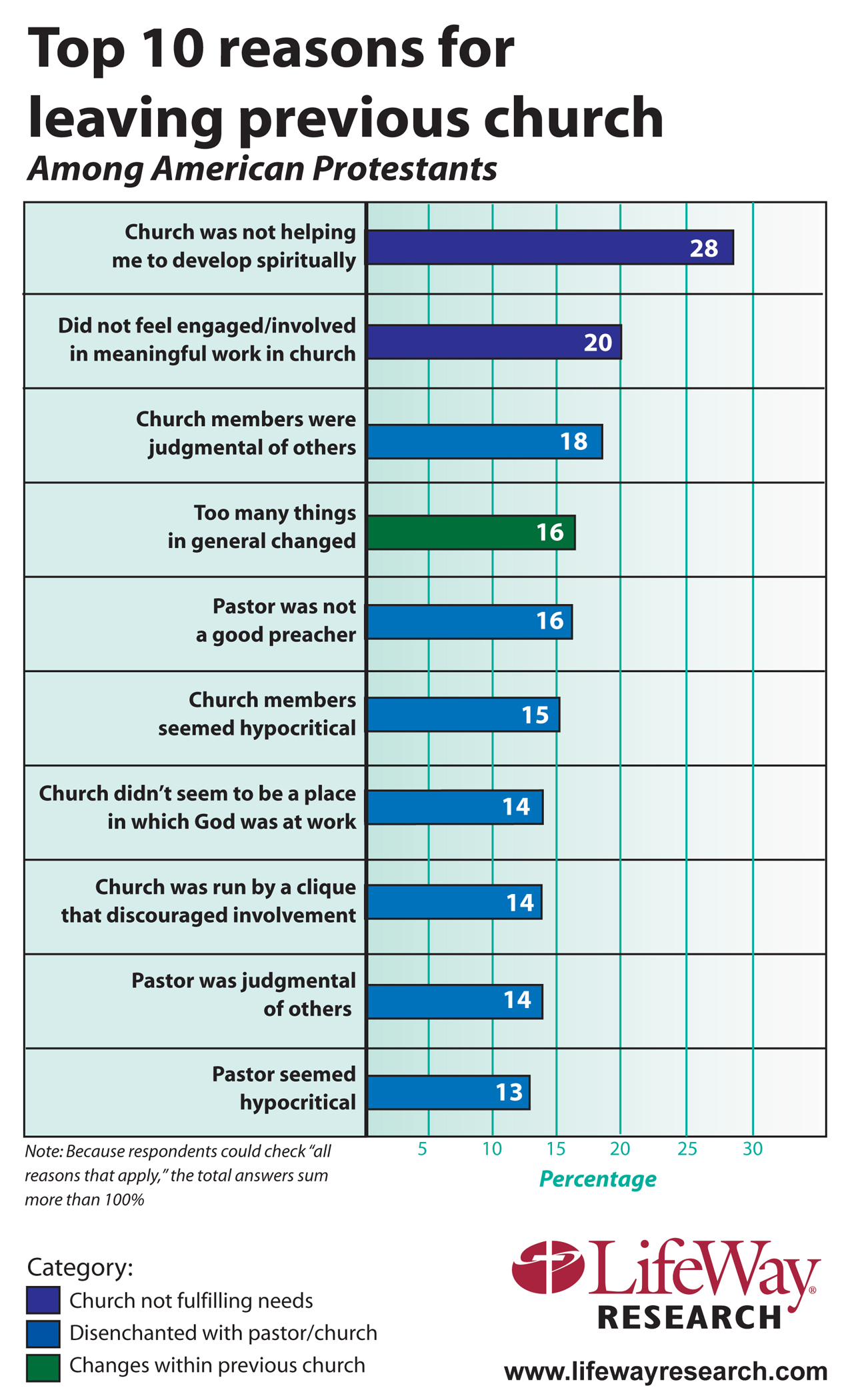
NASHVILLE, Tenn. (BP)–Generally, adults who change churches for reasons other than moving are more likely fleeing their previous church rather than being drawn to another, according to a study listing the top 10 reasons for switching churches.
Fifty-eight percent of respondents to a study by the LifeWay Research arm of LifeWay Christian Resources said the greatest impact on their decision to switch churches was “my need/desire to leave my previous church.” The other 42 percent left because of a desire to join their current church, the study reported.
The study builds on LifeWay Research’s 2006 study of the formerly churched, which explored the reasons adults stop going to church. The current findings explain why people change churches and how these situations differ from those in which the individual does not resume church attendance at all.
Church switchers are defined as Protestant Americans who have attended more than one church regularly as an adult.
“There are two types of people who slip out through the back door of the church,” said Scott McConnell, associate director of LifeWay Research. “One group is probably leaving church permanently and the other group is going to find a new church.”
To understand why adults choose to change churches, 415 “non-mover” church switchers — who changed churches for reasons other than changes to their residential location — were surveyed in December 2006.
The top two specific reasons people leave their church have to do with their needs not being fulfilled by their previous church.
Of all reasons churchgoers choose to leave their previous church, the top specific reason is because the “church was not helping me to develop spiritually,” encompassing 28 percent of non-mover church switchers.
Another 20 percent of respondents said they left because they “did not feel engaged or involved in meaningful church work.”
A common element among church switchers is disenchantment with church members. Eighteen percent of respondents indicated “church members were judgmental of others” as a specific reason for switching.
Other member-related reasons for switching were “members seemed hypocritical” (15 percent), “church didn’t seem to be a place where God was at work” (14 percent) and “church was run by a clique that discouraged involvement” (14 percent).
Disenchantment with the pastor also is a common reason churchgoers switch. Sixteen percent cited the “pastor was not a good preacher” as a specific reason for leaving their previous church. Also in the top 10 were “pastor was judgmental of others” (14 percent) and “pastor seemed hypocritical” (13 percent).
Sixteen percent of survey respondents said too many changes in general drove them to switch churches.
One respondent said, “The pastor of my previous church left and the new pastor was radically different, and the music switched from traditional to rock music.”
McConnell said such church switchers leave “because they are unhappy with changes in the overall direction of the church. Respondents had the opportunity to select specific changes they did not like, such as worship style, teachings or a staff member leaving, but the largest proportion selected too many changes in general — the culmination of many changes in the previous church they did not like.”
Church switchers’ disenchantment and disappointment with their previous church’s failure to meet their needs differ from those who do not return to church.
The prior LifeWay Research study of formerly churched adults indicated that the primary reasons given for leaving the church are changes in life situation. While 59 percent of the formerly churched cited this category of reasons, only 21 percent of church switchers leave their previous church because of life changes (excluding moving).
Brad Waggoner, LifeWay’s vice president of research and ministry development, expounds on the church switcher study in a companion article available at lifewayresearch.com and offers suggestions for church leaders who desire to build stronger, healthier churches.
“Of all of the reasons for leaving the church, the top two are ‘the church was not helping me to grow spiritually’ and ‘I did not feel engaged/involved in meaningful work in the church,'” Waggoner writes. “These are actually very encouraging findings. The fact that the majority of church switchers express a desire to grow spiritually and become active in service should strike a chord of optimism for leaders.
“… [T]he most helpful response any leader can make to this study is to allow these findings to fuel the desire to disciple and involve every church member,” Waggoner adds. “With few exceptions, a pastor who possesses solid leadership skills and a passion to disciple and involve others will see this happen in the church.”
–30–














